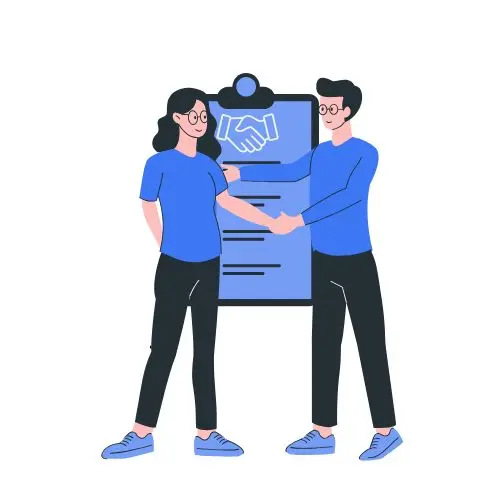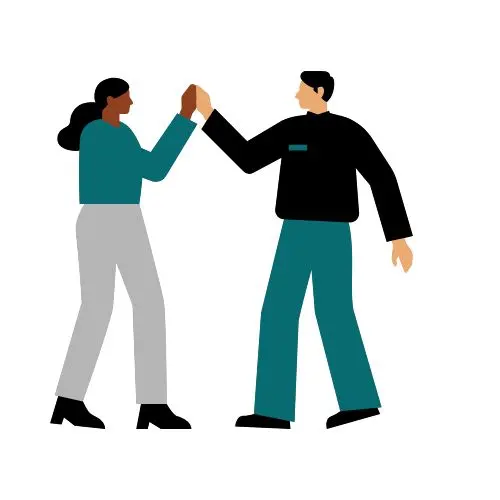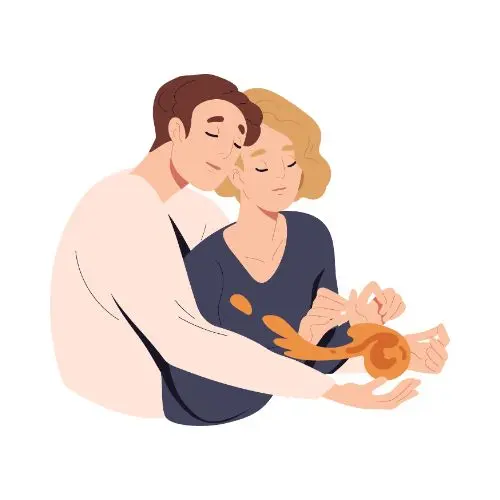What are Rebound Relationships?
A rebound relationship occurs when a person quickly returns to another romantic relationship after the conclusion of a preceding one. The main reason behind entering into such relationships is the emotional consequence of a breakup. They may get into a new relationship either to fill the hole their ex-partner left or to move away from their former relationship.
Not all rebound relationships necessarily end up being harmful or unhealthy, but they can still be complicated and full of mixed emotions. It’s then easy to understand that rebound relationships may actually help people work through the emotions they have for them and then, of course, heal from them.
| Stage | Description | Duration | Emotional Impact | Key Insights |
|---|---|---|---|---|
| 1. Post-Breakup Shock | Initial emotional turmoil after a breakup. | 1-3 weeks | High Discomfort | Understanding grief and loss. |
| 2. Seeking Distraction | Engaging in casual dating or activities for distraction. | 1-3 months | Temporary Relief | Recognizing avoidance behaviors. |
| 3. New Relationship Excitement | Initial thrill and infatuation of a new partner. | 1-6 months | High Euphoria | The allure of novelty can mask deeper issues. |
| 4. Reality Sets In | The realization that the new relationship may not eliminate past pain. | 3-6 months | Confusion & Doubt | Identifying unresolved emotional baggage. |
| 5. Decision Point | Choosing to commit or end the rebound relationship. | 6-12 months | Mixed Emotions | Importance of self-awareness and reflection. |
| 6. Healing and Growth | Focus on personal growth and emotional healing. | Ongoing | Positive Transformation | Emphasizing personal development post-rebound. |
Rebound relationships take on many of the very interesting aspects of human behavior, and though all that emerges is cause for concern and argument, people get into rebound relationships following a breakup because they find a new partner through the pain. For comfort or consolation, and sometimes even to be distracted. In all those rebound relationship stages, however, lies the actual affair, and knowledge of the process helps people through. This page discusses the common five stages of a rebound situation and guidance on handling them.
Understanding the Stages of Rebound Relationships

Understanding the stages involved is important to fully grasp the nuances of rebound relationships. Each stage has unique emotions, challenges, and potential for growth.
1. Post-Breakup Shock
Duration: 1-3 weeks
Emotional Impact: High Discomfort
Key Insights: Understanding grief and loss.
Healing will begin immediately following the break-up. The loss brings shock, sadness, anger, and confusion to life. At this point, people experience deep loneliness and heartbreak. One needs to grieve at such a point and feel these emotions completely. Most people are always alone during this stage, but they feel forced into something new to fill that emotional void.
2. Seeking Distraction
Duration: 1-3 months
Emotional Impact: Temporary Relief
Key Insights: Recognizing avoidance behaviors.
Meanwhile, they try to forget their hurt; they start dating casually, join hobbies, or re-establish friendships as comfort zones. At this point in time, the temporary mood swingers will probably make choices that lead to “partners” who are “just adequate” to distract rather than really connect.
3. New Relationship Excitement
Duration: 1-6 months
Emotional Impact: High Euphoria
Key Insights: The allure of novelty can mask deeper issues.
This is when most couples spend hours together in blissful highs, ignoring red flags or unresolved feelings from previous relationships. It’s essential to note that these feelings may be unsustainably wielded; thus, excitement over a new relationship may not necessarily translate into a good base for future growth.
4. Reality Sets In
Duration: 3-6 months
Emotional Impact: Confusion & Doubt
Key Insights: Identifying unresolved emotional baggage.
Reality sets in at this point since people soon realize the new relationship doesn’t mend the old pain. When infatuation disappears, nagging doubts, insecurities, and unresolved emotions come flooding back. It is crucial to face these feelings more adequately and then let oneself judge the worthiness of the new relationship based on what one actually wants and needs going forward.
5. Decision Point
Duration: 6-12 months
Emotional Impact: Mixed Emotions
Key Insights: Importance of self-awareness and reflection.
Once the rollercoaster of emotions created by the breakup has passed, the person reaches a critical decision-making juncture. They have to either go deep into the new relationship while trying to work out the remaining emotions associated with the previous one or end the relationship to find personal growth. It is the moment when reflection becomes key, where a person gets to check if the new partner brings joy and support or is a distraction.
6. Healing and Growth
Duration: Ongoing
Emotional Impact: Positive Transformation
Key Insights: Emphasizing personal development post-rebound.
In conclusion, while rebound relationships are hard to navigate, if people engage in personal development after them, they can emerge even more empowered and self-aware. This stage often entails specific healing-from-activities initiated, such as therapy, self-analysis, or passion projects. Lessons from the rebound and previous relationships are worth learning and bring many health benefits to future relationships.
The Benefits of Understanding Rebound Relationship Stages
Understanding the stages of rebound relationships can provide several benefits:
- The greater emotional awareness of knowing how each stage would impact the person’s emotions made them stand by their feelings rather than run away.
- Better Choices of Relationships: Unawareness of pitfalls caused by rebounding at some levels enables people to be more cautious while making subsequent relationship choices.
- Personal Development: One learns his chance to heal up, grow emotionally wise, and gain deeper insight into one’s life, eventually leading to long-term happiness.
- Improved Communication: An emotionally responsive person communicates better to his partners and clearly delivers his requirements and desires.
- Better Preparation for Future Relationship Life. Reprocessing of the experience can lead to better foundations for future relationship life through emotional awareness.
Navigating Rebound Relationships with Grace

While rebound relationships can be challenging, navigating them gracefully can lead to positive outcomes. Here are several strategies for managing this complex emotional landscape:
1. Allow Yourself to Grieve
One of the most important healing steps is permitting oneself to grieve the loss of an old relationship. But if one refuses this process, locked, the feelings remain and return with both hands flailing.
2. Take Time Before Jumping In
It is better to spend the time healing rather than giving in to this urge and seeking a new relationship as a distraction. Go out there, do joyful things, and focus on growing.
3. Communicate Openly with New Partners
If entering a new relationship, be as honest with your emotional state and the past as possible. The best foundation for trust and mutual understanding is open communication.
4. Evaluate Your Feelings Regularly
Keep checking in with yourself often to assess your emotional needs. Are you still looking for distraction, or have you actually grown real feelings towards this new person? Being self-aware will allow for healthier choices.
5. Seek Professional Guidance
Consider speaking with a therapist or counselor to navigate complex emotions. A mental health professional can provide invaluable insights and coping strategies.
Conclusion
Rebound relationships, however, can become a double-edged sword. They offer avenues for new contacts and expansion but come with emotional risks. Knowing the stages of rebound relationships helps individuals better navigate their emotional psyches, deepen their personal growth, and ultimately emerge stronger and more self-aware.

